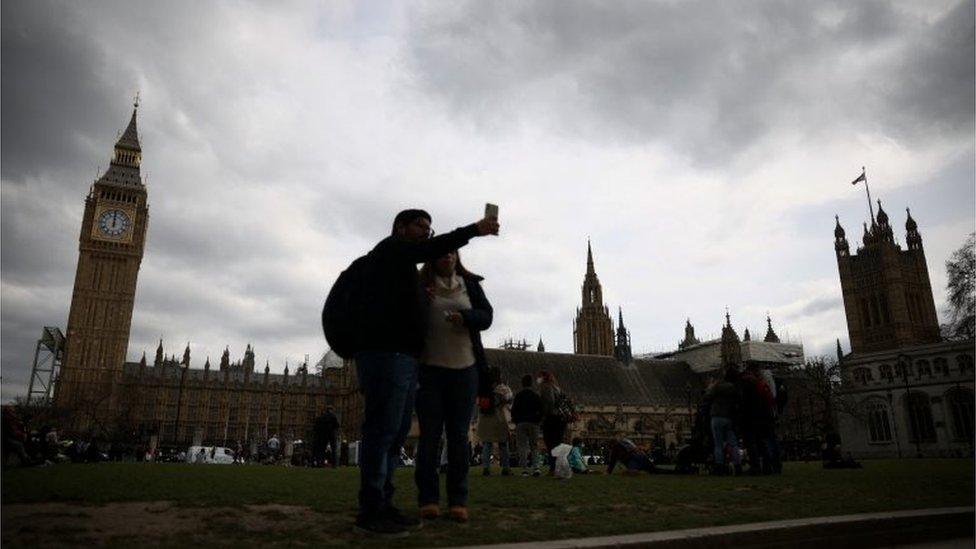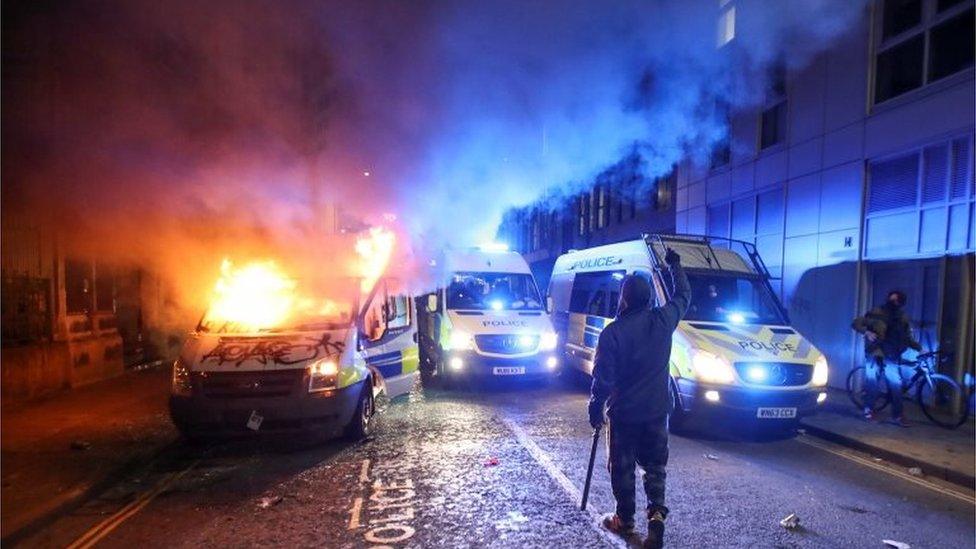What's happening in Parliament next week?
- Published

"It's very tense, it's very heated, the chamber's almost boiling over," the Commons Speaker, Sir Lindsay Hoyle told me on Radio 4's Today in Parliament, after a week dominated by moves to launch a parliamentary inquiry into the prime minister's Partygate statements.
And MPs are facing another temper-fraying week, with plenty of late sittings and tetchy exchanges with the Lords, as the Commons seeks to polish off the remaining legislation before Parliament, even as the fallout from Partygate continues.
This Wednesday saw 12 Commons divisions (votes in which the MPs troop through lobbies to be counted) enlivened by the failure of the voting card readers in the "no" lobby - a process which will have taken the best part of three hours.
The votes were mostly on rejecting a series of changes made by peers to the Nationality and Borders Bill - setting up a confrontation with the Upper House when noble lords debate their response on Tuesday.
Peers had filleted out major parts of the bill, particularly the sections criminalising arrival in the UK without clearance, and dealing with the "offshoring" of asylum seekers to third countries, while their cases are considered.
The latter is not the same as the government's new policy of sending asylum seekers to Rwanda, because that is aimed at people who have not been given residence in the UK, but it's obviously closely related.
The announcement of the new policy seems to have increased the temperature, at a point when peers might normally have been considering backing down in the face of the will of the elected house.
Watch out too for another iteration of the Conservative Baroness Stroud's amendment allowing asylum seekers the right to work if their case has not been decided after six months.
And that's just one of the major bills still in play as the final sands of the current parliamentary session trickle down the hourglass.
The Commons will spend Monday responding to Lords amendments to the Police, Crime, Sentencing and Courts Bill, (where there are outstanding issues on controlling noisy demonstrations).
They will also debate the Health and Care Bill, where the Lords have insisted on removing a clause that would have meant local council contributions to care costs don't count towards the cap on the care costs people pay, before the state picks up the bill.
The argument is that this effectively runs down poorer people's savings.
The government has now offered up a concession on ensuring NHS procurement should avoid products of modern slavery, but that still leaves very significant disagreements over ministers powers to intervene in reconfiguration of local services, (like hospital closures), and on having three-yearly independent reports on the NHS's workforce needs, so that the government will be able to train sufficient doctors, nurses, specialists, etc.

The Police, Crime, Sentencing and Courts Bill, which prompted protests in Bristol last year, will be debated in Parliament
Tuesday sees MPs considering Lords amendments to the Judicial Review and Courts Bill - including an amendment which said bereaved family members should be entitled to publicly funded legal representation at inquests, when public bodies like hospitals or the police are legally represented.
The Lords also removed a clause limiting certain types of judicial review, and other changes to the workings of judicial review.
This is more politically sensitive than it might sound, because it mainlines into concerns about using the courts to delay deportations.
The fun continues on Wednesday, with MPs turning to Lords amendments to the Elections Bill - which is only scheduled to complete its passage through the Lords on Monday.
So far peers have voted to expand the list of documents voters can use to confirm their identity at polling stations, to include non-photographic documents like birth or marriage certificates and financial documents.
Noble Lords' toothbrushes
And on Monday there will be an attempt to defeat the government on another key part of the bill, and remove the proposed powers for ministers to direct the watchdog body, the Electoral Commission, by issuing a statement on its strategic and policy priorities.
So potentially a couple of days before the end of the parliamentary session, a major and contentious piece of legislation is un-agreed.
If necessary, MPs may also chew over further Lords amendments to the Nationality and Borders Bill - depending on how peers have reacted to the Commons rejection of their earlier amendments.
So over several days some major bills will be bouncing between the two houses of Parliament as the process of agreeing their most controversial clauses continues.
There is no "three strikes and you're out" rule.
The process goes on until compromise is reached or one side or the other folds… and that means announcements that "the House is adjourned during pleasure" (which always sounds a bit Kenneth Williams to me) plus late night sittings, behind-the-scenes negotiations, and parliamentarians whiling away the hours, waiting for the next set of votes.
Honourable members and Noble Lords would be well advised to pack toothbrushes and changes of clothing, and to cultivate a mindful calm to see them through.
Legislative hamster wheel
Parliament could be prorogued (suspended) at any time from Thursday 28 April to Wednesday 4 May - to allow for the new session, with its new programme of law-making, to be launched at the State Opening on 10 May.
And bills not agreed when the music stops automatically fall - so there's a great deal of brinkpersonship around this flexible deadline, with most parliamentarians keen not to sit in local election week.
Aside from the whirl of the legislative hamster wheel, there are some interesting debates to look out for.
Tuesday sees a Backbench Business Committee debate on childhood cancer outcomes which was postponed from the previous week.
Former health minister Dame Caroline Dinenage and others are pushing for better detection and treatment of cancer among children - the leading cause of death among children - and better provision for families at their child's bedside.
And with recommendations for radical new anti-smoking policies expected from Javed Khan, former chief executive at Barnardo's who has been looking at ways to reduce smoking trends amongst young people, Conservative Bob Blackman leads a debate in Westminster Hall, (09:30) on the government's Smokefree 2030 ambition.
Select committee highlights include Home Affairs opening session of its inquiry into illegal drug use (Wednesday 10:00) with evidence from academics.
The International Trade Committee quizzes Secretary of State, Anne-Marie Trevelyan, on the UK's international trade performance. (also 10:00 Wednesday).
